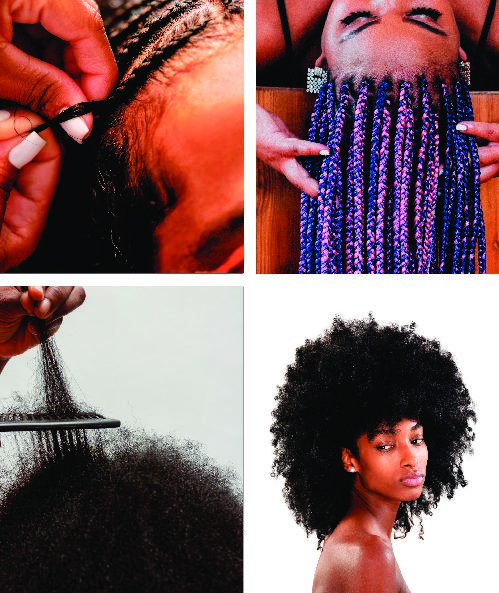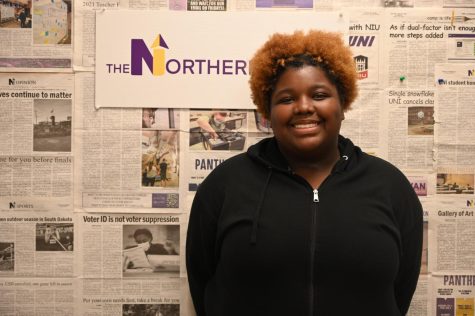Black women vs the world

Many black women face insecurities about their hair due to constant discrimination.
Feb 2, 2023
As reported by NBC News, Daystar Peterson, better known as Tory Lanez, was charged with the following: unregistered gun possession, assault with a firearm and gross negligence of a firearm in 2020 following a heated argument outside of Kylie Jenner’s house party. The woman he shot was Megan Jovon Ruth Pete, better known as rapper Megan Thee Stallion. Ever since she cited him as her shooter, she has endured thousands of hate comments for not staying silent and for lying.
Pete’s case is just one example of a complex sexism that is specific to Black women – misogynoir. The word misogynoir was coined by gay Black feminist Moya Bailey, Ph.D, in 2010. Misogynoir is pervasive in American culture and society.
Misogynoir is a new term, but not a new concept. It is deeply ingrained into American society due to racist ideologies. Historically, racism towards Black women meant separation of the perfect submissive White woman from the deviant Black slave.
In an article by Mia Moody about News-Media Stereotypes and the Media Analysis of Barack and Michelle Obama, Moody cites feminist theory and the representation of Black women. “Black feminists argued that Black women’s experience isn’t separable from racism.” Rather, “women of color experience sexism within the context of racism.” In the media, Black women fall into the dichotomies of either/or: unintelligent/extremely smart, hypersexual/asexual, highly attractive/undesirable and ambitious/lazy. Common stereotypes that are a result of racism present in media and culture are the jezebel trope, sapphire/angry Black woman, and the strong Black woman/superwoman schema.
Jezebel stereotype
In the old testament of the Christian Bible, Jezebel was the wife of King Ahab of Israel and she used her sexuality to manipulate men to get what she wanted. In the 1600s when Europeans were making contact with Africans, they often denigrated African cultures as subhuman and profane. Semi nudity was seen as sexually promiscuous. By labeling Black people as sexually deviant to their insatiable sexual appetites, sexual abuse and assault was justifiable. Black women’s bodies were a commodity for reproductive labor and due to their slave status, they had little to no agency over sex. In our society, it means a Black body is inherently sexual and impure.
It’s very important to note that Megan Thee Stallion, who will be referred to as Pete, was not on trial nor facing any charges in the Lanez case. She was the victim. Despite this fact, a main focal point used to discredit her online was her sexual history.
During her interview with Gayle King, when asked about whether she was intimate with Lanez, she said no. She later admitted on the stand that she lied because she was ashamed she shared her body with someone who could cause her so much pain. She wishes that she had just died that night because of the backlash she has received for speaking out. Pete’s sexual history is irrelevant to the fact that she was shot. Pete makes very sex positive music and is not shy about her sex life. Others like here tend to be silenced and seen as less believable when they speak up about the violence they’ve endured the jezebel trope is often played out in the courts to discredit and belittle Black women and girls. By viewing Black women as less innocent due to their inherently “sexual bodies,” it means they are at fault and culpable of violence against them since they don’t look like the perfect victim.
This leads to the dangerous belief that Black women are immune to harm or “tough enough” to endure trauma as part of their nature.
Angry Black Woman/Sapphire
Historically, the sapphire was seen as a Black woman who uses exaggerated, overly sassy body language: hands on hips, finger wagging to emasculate the men around her. The angry Black woman is its successor. The angry Black woman is always upset, aggressive, loud and rude. The angry Black woman is a dismissive figure in our culture who is not to be taken seriously as it’s in her nature to be angry. This belief dismisses Black women’s concerns and right to express themselves emotionally because any reaction from a Black woman is essentially an overreaction.
The Strong Black Woman/ Superwoman schema:
In the article Strong Black Woman and Identity, the strong Black woman is essentially a reaction to stress from gender and racial discrimination. The superwoman is one who has a large desire to succeed, usually super independent to the point help is not an option, reserved emotions and a strong obligation to help others. These traits can be very useful in environments that have high levels of racial and gender discrimination; these qualities can protect one’s health. However, the superwoman schema can be detrimental to one’s health too. Dr. Amani M. Allen, associate professor at Berkeley University of California and lead author of African American Women’s Heart and Health Study, states that “this idea of being strong Black women and feeling the need to prepare for racial discrimination on a daily basis and anticipation adds to their overall stress burden.” Allen’s co-author Dr. Yijie Wang, associate professor at Michigan State University also says that the trope “reflects gendered racial socialization African American women receive in life”.
The pressure to be superhuman leads to self-sacrifice that does more harm than good. In Pete’s case, the strong Black woman trope is very prevalent. Before the shooting, she bonded with Lanez because they both lost their mothers around the same time. Pete’s mother died in 2019 and her grandmother shortly after. By lying to the police, she sacrificed her reputation for Lanez’s safety the night of the shooting. Pete initially lied to the police when she stepped on glass. Due to their being a gun at the scene, she was scared for everyone’s lives that the police would shoot, following George Floyd’s murder by the police. She protected Lanez, despite him shooting her, from the police and still endured lots of hate from his fans. She had to remain strong with little to no support system. She broke up with her best friend, was still mourning the loss of her mother and grandmother and dealing with the fact someone she cared about shot her.
The stereotype of the strong Black woman in America is a means of survival. It also makes it seem that Black women have a higher pain tolerance than others, are meant to endure the worst that society has to offer and that they’ll be fine without any support. This belief is especially dangerous in healthcare since it leads to less coverage and support for medical conditions and pain management.
Colorism
Colorism is the preferential treatment of lighter-skinned people in a community. For Black women, this equates to the glorification and fetishization of the “Red bone,” “yellow bone,” exotic girls who are Black but don’t look “too Black.” This is largely because of the way those who are lighter-skinned are closer to passing as white, thus not enduring as much discrimination as their darker-skinned counterparts. This is very evident in the music industry with light-skinned artists like Ice Spice, Latto and Coi Leray receiving more mainstream attention than darker-skinned artists like Normani, Monaleo, who recently spoke up about colorism, and Bree Runway.
Colorism categorizes people as “overly desirable” or “less desirable” based on their skin color. Being raised with these ideals can cause a lot of trauma and self-hatred, leading to people lashing out against each other due to insecurities about their skin color.
Featurism
Featurism is preferential treatment for people who have Eurocentric facial features; it degrades big lips, broad noses, and anything “big” on a Black person’s body. Featurism disproportionately affects women more than men.
Conversely, with the emergence of Blackfishing, a term coined by Canadian journalist Vanna Thompson, white people are able to pick and choose aspects of Blackness they like and make money from it. For example, Black dark-skinned people aren’t shown in the media as desirable as a person with an extreme tan. Blackfishing is essentially the cosplay of Blackness by white and non-black women. Think Kylie Jenner, Kim Kardashian and Emma Hallberg.
They look drastically different online with super dark skin and bigger lips compared to real life. This is because Blackness in America is also a commodity that can be profited from leading to gross misuse of the culture that excludes those who made it from they gain. There is a large difference between appropriation, which is plagiarization and no credit, and appreciation, which is reciprocal. Ironically enough, it leaves Black people out because “a lot of people want to be Black, but nobody wants the struggle.”
Texturism
Texturism is discrimination based on hair type. It’s very prevalent in school and workplaces that will disproportionately ban certain black hairstyles. The slang “good hair” means smooth and loose hair. Good hair, up until the late 2010s, did not include kinky, tightly coiled afros, locs or twists. Black women who had “nappy” afro hair texture were deemed as “undesirable,” and “unprofessional.” This is attributed to anti-Black ideologies that say that Blackness is inherently ugly and that having outwardly Black features that have been degraded to being undesirable challenges those that established the norm.
In YouTuber Clarrisa C’s video “It Sucks Being the Token Black Girl,” she covers the discrimination of actresses Kat Graham from “The Vampire Diaries,” Monique Colemen from the “High School Musical” film series, and Trina McGee from “Boy Meets World.” Clarrissa C surmises that the negligence of Black beauty is as detrimental as the absence of Black characters in media.
Graham is of African American and Jewish lineage and has very curly hair that is rarely seen on screen. She played Bonnie, main character Elena’s best friend and magical reset button. Bonnie is a powerful Bennet witch who’s love interest dies every other day. Graham’s character was every other character’s assistance button. Due to the very biased writing against Graham’s character, Bonnie rarely received the same kind of happy endings as her friends. This bias also applied to her hair too. Graham requested that she film with her natural hair but was shot down, so poorly made wigs were used. The wigs were so tight that they actually caused damage to her real hair.
McGee played Angela, Shawn’s girlfriend, in “Boy Meets World.” She’s spoken out against the mistreatment by both the cast and production. She was told to “turn down her Blackness,” referred to as Aunt Jemima by a co-star and eventually written off the show abruptly.
Angela’s signature hairstyle was done by the actress herself. Microbraids, which are very small braids, take a painstakingly long time to do 12 hours or more. McGee spent the night before her first episode doing the micro braids herself.
Coleman portrayed Taylor McKessie, Gabriella Montez’s smartest best friend. Taylor’s signature hairstyle was a short bob covered by a headband. This was suggested by Coleman because the stylists were not familiar with Black hair. It’s very worrisome that there were no stylists who were available. Despite being a very important supporting character to Troy and Gabriella, she was excluded from promotional tours for the final movie, “High School Musical 3: Senior Year.” Coleman stated that “Disney broke her heart.”
According to author Maya Goodfellow, “a Black woman who unapologetically challenges will always be judged unfairly. Too many feel like it’s not up to her to be the voice of dissent.”
Trevor Noah, a South African comedian and former talk show host and author of “Born a Crime,” shouted out Black women as a whole for raising him as he closed his show. During an emotional reflection, he said, “If you truly want to learn about America, talk to Black women. They can’t afford to f— around and find out like everyone else.”
The issue with misogynoir isn’t that Black women are learning to cope with it, but that it exists to begin with.








